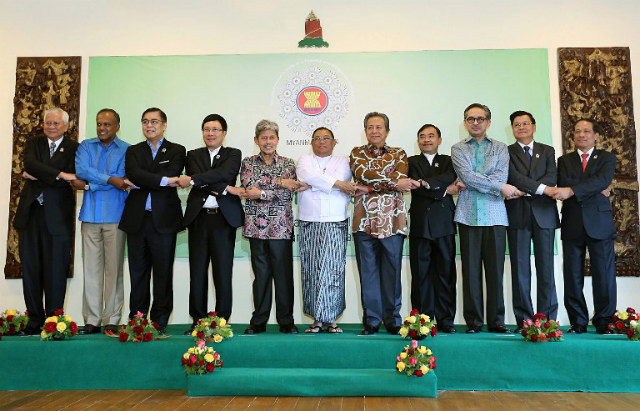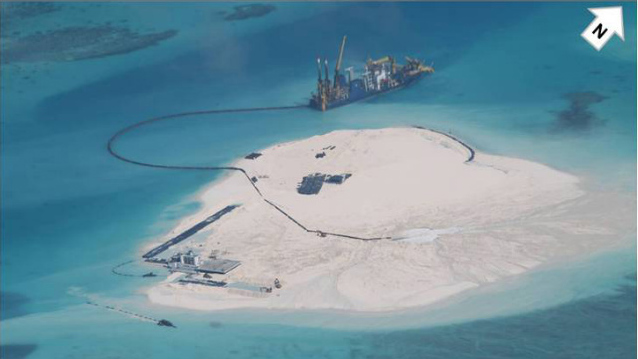'The triple action plan has a snowball's chance in hell of success,' an analyst says. But the Philippines says, 'China might be convinced, who knows?'

CONSENSUS SOON? Philippine Foreign Secretary Albert del Rosario (first from left) and his ASEAN counterparts meet in
Experts downplayed the Philippines' proposed triple action plan (TAP), which includes a moratorium on provocative actions in the disputed South China Sea, even as the Philippines said China might be convinced to heed it.
Maritime law expert Jay Batongbacal told Rappler on Thursday, August 7, that the TAP will not work without China's consent.
He said China, after all, is the “object” of the moratorium that the Philippines is set to propose to the Association of Southeast Asian Nations (ASEAN).
Speaking to Deutsche Welle, Southeast Asian studies expert Vikram Nehru also doubted the TAP's success citing China's refusal to cooperate.
The Philippines crafted the TAP after China started building artificial islands in the South China Sea, which allegedly changes the status quo in the disputed waters. The Southeast Asian country said it will propose the TAP in the ASEAN Ministerial Meeting in Myanmar from Friday to Sunday, August 8 to 10.
“But China has already said that it will not abide by a moratorium...so where else will that go? If you're talking about effectively stopping or preventing China from changing the status quo, clearly it's not going to work because of that statement,” said Batongbacal, director of the University of the Philippines Institute for Maritime Affairs and Law of the Sea.
China has rejected the TAP by saying it “can build what it wants in the South China Sea,” Reuters said in a report.
'Same situation'
Despite this, the Philippines pushes for the moratorium as the “immediate approach” to resolve South China Sea disputes.
The moratorium in the TAP is seen as a “more concrete definition” of the ASEAN-China Declaration of Conduct (DOC) of Parties in the South China Sea, a 2002 statement to maintain peace in the disputed waters.
Under the TAP, the Philippines also proposes an “intermediate” and a “final” approach.
The intermediate approach is to highlight “the need and call for the full and effective implementation of the DOC and the expeditious conclusion of the Code of Conduct,” a binding document to replace the DOC.
The final approach is to underscore “the need for a settlement mechanism to bring the disputes to a final and enduring resolution anchored on international law” – a move that the Philippines took when it filed a historic case against China in 2013.
Batongbacal, however, said he sees the TAP as “basically the same as the 3-pronged strategy” that the Philippines has emphasized especially in the past two years, since the standoff between Philippine and Chinese vessels in Scarborough Shoal in 2012.
“The only difference right now is that they're specifically asking for a moratorium as part of the diplomatic track. So it's still the same situation. I don't see anything that changes the equation,” he said.
The 3-pronged strategy, or the 3-track approach as the Philippines' Department of Foreign Affairs (DFA) calls it, involves the political, diplomatic, and legal tracks.
The DFA said in 2013 that the legal track, which involves filing a case against China, “presents the most durable option to defend the national interest and territory on the basis of international law.”
China has rejected the case, while political and diplomatic moves have failed.

'MORATORIUM' SOUGHT. The
'Snowball's chance in hell of success'
Nehru, for his part, told Deutsche Welle that “the main Southeast Asian claimant states,” such as the Philippines and Vietnam, “would be willing to consider the moratorium.”
The Philippines has said at least 3 ASEAN member-states support the TAP.
Nehru noted, however, that China has rejected the TAP, “and its reiteration at the Myanmar meetings will not change that position.”
“The triple action plan has a snowball's chance in hell of success,” he said.
The analyst explained that China “has not only rejected a freeze on construction activities in the South China Sea,” but also arbitration proceedings.
The Asian giant “has also not been in any hurry to finalize” the COC, “arguing that it should be the result of consensus while keeping 'the comfort of all parties in mind.'”
Nehru added that China rejects third-party involvement in South China Sea disputes – as seen in the TAP because a United States official proposed it.
'China might be convinced'
Batongbacal said “the best thing that can come out” of the TAP is “if it creates a united front among ASEAN members.”
This means setting “the ground rules for the region.”
“China will not participate, so in that sense it's not going to work against China. They will not be able to get China to agree to stop its activities, but it will cast Chinese activities in a rather bad light. So the result is political,” Batongbacal said.
The DFA, on the other hand, remained optimistic.
In a media briefing on Wednesday, August 6, DFA spokesman Charles Jose said: “It's good to hear about this proposal first. It's good for claimant countries, non-claimant countries, as well as the international community, to hear the proposal first and decide on the merits.”
When asked how the TAP will work without China, Jose said, “It's important that China is onboard.” (READ: Philippines: 'Triple action plan' can help China)
“Let's see first,” he added. “China might be convinced, who knows?”
http://www.rappler.com/nation/65540-philippines-triple-action-plan-china-cooperation

No comments:
Post a Comment
Note: Only a member of this blog may post a comment.